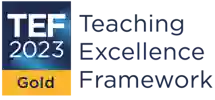Our teaching is worth its weight in gold
Hull was rated Gold in the Teaching Excellence Framework (TEF) 2023. It lasts for four years and is the highest possible ranking for teaching quality and student success.

What does the Teaching Excellence Framework mean for you?
You’ll be studying at a university where the teaching, student experience and student outcomes have all been assessed as “typically outstanding”.
How have we done it? We’ve listened to our students, transformed our approach to teaching, enhanced our academic and pastoral support, and empowered our team to achieve their own personal and professional success. This has all been recognised by the Teaching Excellence Framework.
The gold standard for education
What sets our teaching apart
Our competency-based approach is all about shifting our focus from what our students know to what they can actually do. Our courses go beyond acquiring knowledge. They help our students become independent learners, confident explorers, and critical thinkers. Here’s how we do it…
Excellent research-led teaching and outstanding student experience are the signature of progressive universities that are delivering the best outcomes for their students. I'm delighted that we have been recognised as ranking with the best.Professor Dave Petley
Vice-Chancellor, University of Hull
FAQs about the Teaching Excellence Framework
The TEF is a national scheme run by the Office for Students (OfS). It aims to encourage higher education providers to improve and deliver excellence in the areas that students care about the most: teaching, learning and achieving positive outcomes from their studies. Student outcomes relates to the extent to which the University’s students succeed in and beyond their studies, and the educational gains delivered for students.
The TEF does this by assessing and rating universities and colleges for excellence above a set of minimum requirements for quality and standards. Providers that take part in the TEF receive an overall rating as well as two underpinning ratings: one for the student experience, and one for student outcomes. The ratings reflect the extent to which a provider delivers an excellent experience and outcomes for its mix of undergraduate students, and across the range of its undergraduate courses and subjects.
Stay in touch
